- Home
- Nevil Shute
The Breaking Wave
The Breaking Wave Read online
NEVIL SHUTE
The Breaking Wave
Nevil Shute Norway was born in 1899 in Ealing, London. He studied Engineering Science at Balliol College, Oxford. Following his childhood passion, he entered the fledgling aircraft industry as an aeronautical engineer working to develop airships and, later, airplanes. In his spare time he began writing and published his first novel, Marazan, in 1926, using the name Nevil Shute to protect his engineering career. In 1931 he married Frances Mary Heaton and they had two daughters. During the Second World War he joined the Royal Navy Volunteer Reserve where he worked on developing secret weapons. After the war he continued to write and settled in Australia where he lived until his death in 1960. His most celebrated novels include Pied Piper (1942), A Town Like Alice (1950), and On the Beach (1957).
ALSO BY NEVIL SHUTE
NOVELS
Marazan
The Mysterious Aviator (UK title, So Disdained)
Lonely Road
Kindling (UK title, Ruined City)
Ordeal (UK title, What Happened to the Corbetts)
An Old Captivity
Landfall
Pied Piper
Pastoral
Most Secret
The Chequer Board
No Highway
A Town Like Alice
Round the Bend
The Far Country
In the Wet
Beyond the Black Stump
On the Beach
The Rainbow and the Rose
Trustee from the Toolroom
Stephen Morris and Pilotage
AUTOBIOGRAPHY
Slide Rule
Contents
Cover
About the Author
Other Books by this Author
Title Page
Chapter One
Chapter Two
Chapter Three
Chapter Four
Chapter Five
Chapter Six
Chapter Seven
Chapter Eight
Chapter Nine
Chapter Ten
Copyright
I shall never be friends again with roses;
I shall loathe sweet tunes, where a note grown strong
Relents and recoils, and climbs and closes,
As a wave of the sea turned back by song.
There are sounds where the soul’s delight takes fire,
Face to face with its own desire;
A delight that rebels, a desire that reposes;
I shall hate sweet music my whole life long.
The pulse of war and passion of wonder,
The heavens that murmur, the sounds that shine,
The stars that sing and the loves that thunder,
The music burning at heart like wine,
An armed archangel whose hands raise up
All senses mixed in the spirit’s cup
Till flesh and spirit are molten in sunder—
These things are over, and no more mine.
A. C. SWINBURNE
ONE
THERE was a layer of cumulus, about seven-tenths, with tops at about five thousand feet as we came to Essenden airport; we broke out of it at two thousand and we were on the circuit downwind, with the aerodrome on our starboard wing. I sat with my eyes glued to the window looking out at Melbourne, because this was my home town and I had been away five years. The hostess touched me on the arm and drew my attention from the scene, and told me to fasten my safety belt. I had not seen the sign light up.
“Sorry,” I said.
She smiled, and then she said quietly, “Would you like any help down the gangway, sir?”
I shook my head. “I’ll wait till the others are all off. I’m all right if I take my time.”
She nodded and moved on, courteous and efficient. I wondered how she knew that going downstairs was the tricky part; perhaps that was a feature of her training, or perhaps the hostesses on the machine from San Francisco had told her about me at Sydney. I turned back to the window to watch the approach to the runway and the landing, and I remained absorbed in the techniques till the machine came to a standstill at the terminal building and the engines came to rest.
While the other passengers got off I sat at the window trying to see who was there to meet me. It was likely to be my father. I hadn’t given them much notice for I had only telegraphed the time of my arrival from Sydney when I landed there the previous evening and it was barely two o’clock now; moreover they weren’t expecting me for another four days and we live a hundred and twenty miles from the airport. The wing hid a good part of the enclosure but I saw nobody I knew. I wondered if I should have to go in to town to the Club and telephone home from there.
I followed the last passenger down the aisle to the door, and thanked the hostesses as I passed them. I made slow time down the steps but once on the flat I was all right, of course, and walked over to the enclosure. Then I caught sight of a face I knew. It was Harry Drew, our foreman, come to meet me. It was a warm, summery spring day and Harry was very smart. He is a man about forty years old, with dark, curly hair and a youthful figure. He was wearing an opulent-looking American shirt without a jacket on that warm day, a brown shirt buttoned to the neck and worn without a tie; his brown-green grazier’s trousers were clean and newly creased and held up with a brand new embossed belt with a large, shiny buckle. He caught my eye and half raised his hand in salutation.
I passed through the gate and he came to meet me. “Morning, Harry,” I said. “How are you today?”
“Good, Mr. Duncan,” he replied. “We didn’t expect you till Friday.” He took the overnight bag from me.
“I came along a bit quicker than I thought I would,” I said.
He was clearly puzzled, as they all must have been, by my telegram. “Did you come on a different ship?” he asked. “We thought you’d be flying from Fremantle, arriving Saturday morning.”
“I didn’t come that way,” I said. “I had to stay in London a bit longer. I flew all the way, through New York and San Francisco to Sydney.”
“Come the other way round?”
“That’s right,” I said. We passed into the airport building. “How’s my mother, Harry? She’s not here, is she?”
“She didn’t come,” he said. “She gets out most fine days, but sitting in the chair most of the time, you know. She don’t go away much now. Three months or more since she went down to Melbourne.” He paused by the newspaper stand. “The colonel, he was coming down to meet you, but we had a bit of trouble.”
“What sort of trouble?” I enquired.
“The house parlourmaid,” he said. “Seems like she committed suicide or something. Anyway, she’s dead.”
I stared at him. “For God’s sake! How did it happen?”
“I don’t really know,” he said. “It only happened this morning, and I left about half past ten to get down here to meet you. She took tablets or something, what they give you to make you sleep.”
“She did it last night?”
“That’s right, Mr. Alan.”
“Who found her?”
“She didn’t come down to her work. They get down to the kitchen in the house about six or quarter past and have a cup of tea. When she didn’t come down Annie went up to her room about seven.”
“Old Annie found her?”
“That’s right. She was dead. The colonel rang through for me to go up to the house, ’n soon after I got there Dr. Stanley, he arrived. I suppose the colonel telephoned for him. But there wasn’t anything he could do; she was dead all right. So then they got on to the police, and just about then your telegram came from Sydney saying you’d be coming in today. The colonel, he couldn’t leave home with all that going on to come down here to meet you, so he said to me to
take the Jaguar and come instead.”
I stood by the paper stand while the crowd milled around us. It was a muddle and a mess, and I was deeply sorry for my father and mother. My father was over seventy and my mother not much less, and neither of them in the best of health. Too bad that they should have a nuisance of this nature thrust on them.
“What did she do it for?” I asked. “In trouble with some man?”
He wrinkled his brows. “I wouldn’t think so,” he said. “Coombargana’s a small place and not so easy to get away from unless you’ve got a car of your own, which she hadn’t. She couldn’t have been going with one of the lads at Coombargana and have no one know about it. I wouldn’t think it was that.”
“How long had she been with us?”
“About a year. Maybe a bit longer. English, she was.”
I nodded; she would have been. English or Dutch or German; an Australian house parlourmaid is rare indeed. “Well, I wish to God she’d picked another day to do it,” I remarked. He grinned, and we went out to where the motor coaches stand to claim my luggage.
The Jaguar was two years old but it was still fairly new; as they grew older my parents were staying more and more at home. They had the Buick, too, which they still used a lot, that they had got through Singapore before I went away to England. We put my suitcases in the boot and Harry said, “Will you drive, Mr. Alan?”
I shook my head; I wanted to be able to see the countryside on this my first day back in my own country. “You take her. How long did it take you to get down here?”
“About two hours and a quarter. I was afraid I’d be late.”
Our Australian main roads are straight and good and relatively empty, but even so an average of over fifty was good going. “You’ve had dinner?” I asked.
He nodded. “I got some tucker while I was waiting for the plane. Do you want to go in to the city before going home?”
I shook my head. “Let’s get going and find out what the form is about this trouble at home.”
He nodded, and we got into the car and drove out of the airport. He made for the Western Highway by a short cut through suburban roads I did not know; there had been much building on the outskirts of the city since I left. I did not talk to him till we were clear of the houses and making good time on the highway out to Bacchus Marsh, but then I began to question him about the property.
“Let’s see,” he said. “It was after you went away that the colonel sold the hard land up on Baldy Hill to the Commission, for resumption? Five thousand two hundred acres he let go, for the soldier settlers. All the bit on the far side of the road, from the cross-roads up to Sinclair’s place.” I nodded. “They cut it up into eleven lots, with eleven houses; there’s chaps in seven of them now and four houses still finishing.” He dropped to forty for a moment behind a trailer truck and then accelerated past it and up to seventy-five again. “I was sorry when the colonel decided to do that,” he said, “but thinking it over, maybe he was right. What’s left is all good land, and we’ve got enough.”
“That leaves us about thirteen thousand acres?”
“Thirteen thousand three hundred and eighty-seven,” he replied.
“What are we running on that now?”
“Thirty-seven thousand, eight hundred and forty Merinoes all told,” he said. “That’s counting this year’s lambs, of course. Six hundred and eighty-two Herefords.”
I nodded, indexing the figures in my memory. This was my business from now on, and everything that I had known and been in Europe was behind me. “Finished the shearing?” I enquired.
“Finished last Friday week,” he said.
“How did it run out?”
“Good,” he said. “We sheared seven hundred and sixteen bales this year.” A bale of wool contains three hundred pounds in weight, and at the prices that I knew were current it was worth about a hundred and sixty pounds, taking an average of the grades. Our wool clip must have been worth a hundred and fifteen thousand pounds or so, and then there would be the sales of cattle and of lambs on top of that. Take away the costs of running the property, say thirty or forty thousand pounds, and we were still left with an income of over a hundred thousand pounds for tax. It had been like that for several years.
“That’s all right,” I said. “How many did we shear last year?”
“Six hundred and seventy-eight bales, Mr. Alan,” he said. “It’s the improved pastures doing it. We sowed another five hundred acres last autumn, across the river, from where we make the firebreak by the marsh up to the main road, Phalaris and Sub Clover.”
“Up to where Harrison’s place is?”
“That’s right, only Harrison’s not there now. He got another property over by Ararat. His place was resumed.”
As we went on into the Western District through Bacchus Marsh to Ballarat he told me all about the property. My father had been ploughing back much of the profits into the land and saving the rest for death duties. He was determined to improve the carrying capacity of the property by mechanisation and re-seeding paddocks and pasture conservation. Silage was made in a big way for winter feed, a novelty since I was at home last, and there were now four big diesel tractors on the place, one of them a crawler. Horses were still used by the boundary riders but draught horses had vanished from Coombargana, and my father drove all over the property in a Land Rover instead of riding on a horse as he had always done when I was young. That suited me, for artificial feet are something of a handicap upon a horse. There was a great deal for me to learn about the property before I could unload some of the work from my parents, and I was quite keen to make a start. First of all, it would be necessary to clean up this infernal business of the house parlourmaid, however.
We passed through Bacchus Marsh and up over the Pentland Hills. On that fine, sunny, warm October day the air was like wine, with all the glistening glamour and the scents of spring. The view was superb from the top; I could see right over to Geelong forty miles away, and the blue curve of the bay as it swung round to Queenscliff and the Heads. Over to the west, ahead of us, the long blue ridge of the Grampians was already showing up over the horizon, over a hundred miles away and twenty miles or so past Coombargana. We dropped down off the hills at eighty miles an hour on the way to Ballarat, and there were the long gorse hedges all in bloom that the property owners in that part affect, mile after mile of them, scenting the countryside in the warm sun as we drove on into the Western District.
This was my own country, and I was glad to be home. When I had come home before I had disliked it all, and fretted bad-temperedly till I got away again. That was in 1946 when I had come out of hospital in England, stumbling along insecurely on my dummy feet. On board the ship I had tried to do too much and had fallen a couple of times in the rough weather of the Bay; after that I had stayed in my cabin most of the time, angry and frustrated. When I had come home it was all too easy and too pleasant for me in the Western District. The wartime restlessness was still on me and the European sense of strife and urgency; I could do little that was effective at Coombargana with my disability and my father was still active and well capable of getting along without me. I stuck it for three years, because it seemed to me that now that Bill was dead and Helen married I ought to be at home learning to carry on the property, but it didn’t work out well. By 1948 I was safe on my feet and able to get about quite normally, but I was thirty-four and life was slipping past me. I could not face burial alive in Coombargana at that age after all that I had been and done during the war, and I began to feel I should go crazy if I didn’t get away from it to England again, where things were happening. I think my parents understood, because they made no objection when I suggested that I should go back to Oxford for a year and finish taking my degree. That was five years ago.
What I didn’t realise then was that it wasn’t England I was really fretting for. It was my lost youth.
I came back this time with a quieter mind, my youth behind me and all packed away. I was thirty-
nine, middle-aged and mature, able to realise and to appreciate that it was not only in England that important things went on, that there were things of consequence and value going on even in my own country. Even the job that I had spurned before, the job of running Coombargana to turn out more meat and wool each year, now seemed to me to be worth doing, not one that would impress the world or get me a knighthood, but a job within my powers and worth doing in a gentle, unsensational way. I owed it to my parents to come home for they were getting tired and old, and sometimes rather ill, and now that I was home I was glad that I had come.
We drove into the suburbs of Ballarat and went trickling along like a twenty year old Austin Seven. I turned to Harry by my side. “This bloody parlourmaid,” I said. “You say she was English. Do you know if she had any relations in Australia?”
“I never heard she had, Mr. Alan,” he replied. “Your Dad might know.”
“Did my parents get her through a registry office?”
He shook his head. “She turned up in Forfar at the Post Office Hotel one day, by bus from Ballarat I think it was. Working her way round the world, with a rucksack on her back—hiking, you might say. She worked in the hotel with Mrs. Collins for a week or two. Then she come out with the postman one day for the ride. Your parents had a Polish married couple but the man was always on the grog, ’n your Dad gave them the sack. Then this girl came along and offered herself for the job, and your mother took her on.”
“How long ago was that?”
“Let’s see,” he said. “It was winter time. August, I’d say—August a year ago.”
I thought about it for a minute. “Do you know where she went for her holiday?”
“I don’t think she took one—not while she was working at Coombargana.”
“What was her name?”
“Jessie Proctor.”
He weaved the Jaguar skilfully through the traffic of the town and drove out down the Avenue of Honour and turned off on to the Skipton road. “You may find your parents kind of upset,” he said presently. “She was the best help they had in the house since I’ve been at Coombargana. I think they liked her, too.”

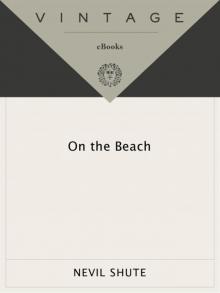 On the Beach
On the Beach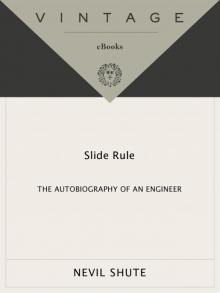 Slide Rule
Slide Rule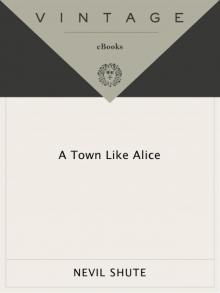 A Town Like Alice
A Town Like Alice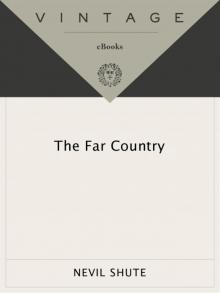 The Far Country
The Far Country Pied Piper
Pied Piper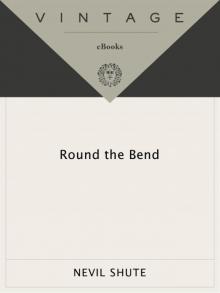 Round the Bend
Round the Bend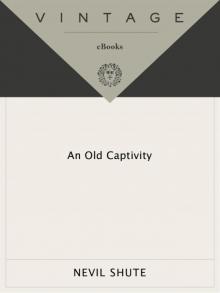 An Old Captivity
An Old Captivity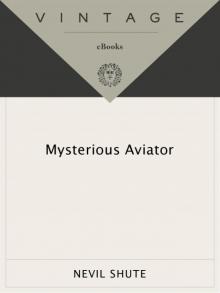 Mysterious Aviator
Mysterious Aviator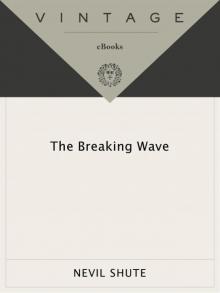 The Breaking Wave
The Breaking Wave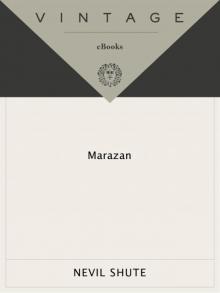 Marazan
Marazan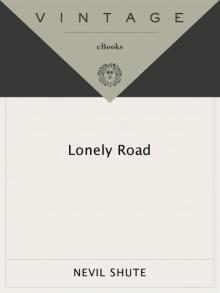 Lonely Road
Lonely Road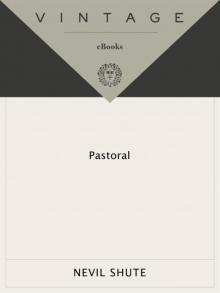 Pastoral
Pastoral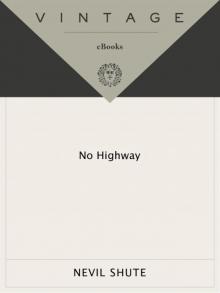 No Highway
No Highway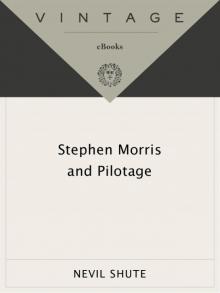 Stephen Morris and Pilotage
Stephen Morris and Pilotage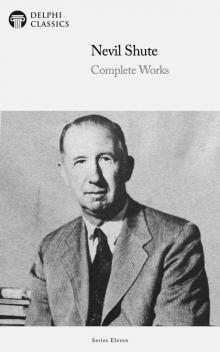 Complete Works of Nevil Shute
Complete Works of Nevil Shute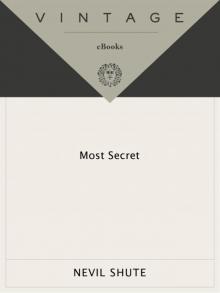 Most Secret
Most Secret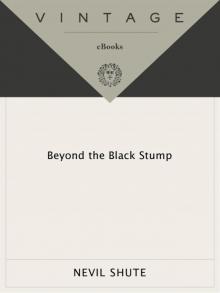 Beyond the Black Stump
Beyond the Black Stump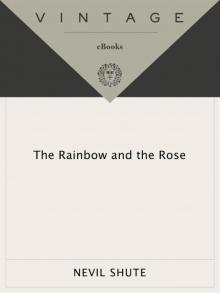 The Rainbow and the Rose
The Rainbow and the Rose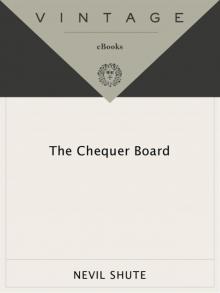 The Chequer Board
The Chequer Board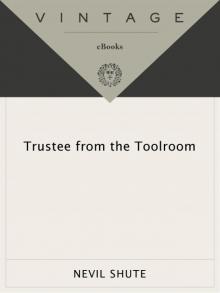 Trustee From the Toolroom
Trustee From the Toolroom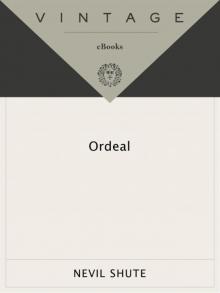 Ordeal
Ordeal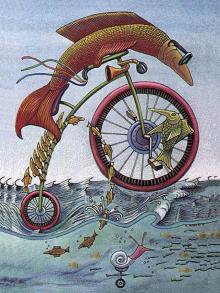 Stephen Morris
Stephen Morris